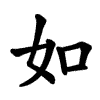Definify.com
Definition 2026
太
太
Translingual
| Stroke order | |||
|---|---|---|---|
| | |||
| Stroke order | |||
|---|---|---|---|

| |||
Han character
太 (radical 37 大+1, 4 strokes, cangjie input 大戈 (KI), four-corner 40030, composition ⿵大丶)
Derived characters
Descendants
References
- KangXi: page 248, character 10
- Dai Kanwa Jiten: character 5834
- Dae Jaweon: page 505, character 1
- Hanyu Da Zidian: volume 1, page 524, character 1
- Unihan data for U+592A
Chinese
|
simp. and trad. |
太 | |
|---|---|---|
Glyph origin
| Characters in the same phonetic series (大) (Zhengzhang, 2003) | |
|---|---|
| Old Chinese | |
| 馱 | *daːl, *daːds |
| 大 | *daːds, *daːds |
| 忕 | *tʰaːds, *daːds, *djads |
| 太 | *tʰaːds |
| 汰 | *tʰaːds |
| 汏 | *daːds, *tʰaːd |
| 軑 | *daːds, *deːds |
| 釱 | *daːds, *deːds |
| 达 | *tʰeːds |
| 杕 | *deːds |
Phono-semantic compound (形聲, OC *tʰaːds) : phonetic 大 (OC *daːds, *daːds, “big; great”) + semantic 丶 – excessive.
Etymology
A superlative derivative of 大 (OC *daːds, *daːds, “big”) – be too great, very great, excessive.
Pronunciation
- Mandarin
- Cantonese (Jyutping): taai3, taai3-2
- Hakka (Sixian, PFS): thai
- Min Dong (BUC): tái
- Min Nan (POJ): thài
- Wu (Wiktionary): tha (T2)
- Mandarin
- (Standard Chinese, Beijing)+
- Pinyin:
- Zhuyin: ㄊㄞˋ
- Wade-Giles: t'ai4
- Gwoyeu Romatzyh: tay
- IPA (key): /tʰaɪ̯⁵¹/
-

- (Standard Chinese, Beijing)+
- Cantonese
- (Standard Cantonese, Guangzhou)+
- Jyutping: taai3, taai3-2
- Yale: taai, táai
- Cantonese Pinyin: taai3, taai3-2
- IPA (key): /tʰɑːi̯³³/, /tʰɑːi̯³³⁻³⁵/
- Note: taai3-2 - “Mrs.” when used on its own.
- (Standard Cantonese, Guangzhou)+
- Hakka
- (Sixian, incl. Miaoli and Meinong)
- Pha̍k-fa-sṳ: thai
- Hakka Romanization System: tai
- Hagfa Pinyim: tai4
- IPA: /tʰa̯i⁵⁵/
- (Sixian, incl. Miaoli and Meinong)
- Min Dong
- (Fuzhou)
- Bàng-uâ-cê: tái
- IPA (key): /tʰɑi²¹³/
- (Fuzhou)
- Min Nan
- (Hokkien)
- Pe̍h-ōe-jī: thài
- Tâi-lô: thài
- Phofsit Daibuun: taix
- IPA (Xiamen): /tʰaɪ²¹/
- IPA (Quanzhou): /tʰaɪ⁴¹/
- IPA (Zhangzhou): /tʰaɪ²¹/
- IPA (Taipei): /tʰaɪ¹¹/
- IPA (Kaohsiung): /tʰaɪ²¹/
- (Hokkien)
- Wu
- (Shanghainese)
- Wiktionary: tha (T2)
- IPA (key): /tʰᴀ³⁴/
- (Shanghainese)
| Rime | |
|---|---|
| Character | 太 |
| Reading # | 1/1 |
| Initial (聲) | 透 (6) |
| Final (韻) | 泰 (25) |
| Tone (調) | Departing (H) |
| Openness (開合) | Open |
| Division (等) | I |
| Fanqie | 他蓋切 |
| Reconstructions | |
| Zhengzhang Shangfang |
/tʰɑiH/ |
| Pan Wuyun |
/tʰɑiH/ |
| Shao Rongfen |
/tʰɑiH/ |
| Edwin Pulleyblank |
/tʰajH/ |
| Li Rong |
/tʰɑiH/ |
| Wang Li |
/tʰɑiH/ |
| Bernard Karlgren |
/tʰɑiH/ |
| Expected Mandarin Reflex |
tài |
| Baxter-Sagart system 1.1 (2014) | |
|---|---|
| Character | 太 |
| Reading # | 1/1 |
| Modern Beijing (Pinyin) |
tài |
| Middle Chinese |
‹ thajH › |
| Old Chinese |
/*l̥ˤa[t]-s/ |
| English | great |
Notes for Old Chinese notations in the Baxter-Sagart system: * Parentheses "()" indicate uncertain presence; | |
| Zhengzhang system (2003) | |
|---|---|
| Character | 太 |
| Reading # | 1/1 |
| No. | 1937 |
| Phonetic component |
大 |
| Rime group |
祭 |
| Rime subdivision |
1 |
| Corresponding MC rime |
泰 |
| Old Chinese |
/*tʰaːds/ |
Definitions
太
- too; so (modifying adjectives; often used with 了 (le) at the end of the sentence for emphasis)
- (usually in negative sentences) very; quite
- most; utmost
- highest; greatest
- senior; noble
- wife; Miss; Mrs
- 太太 ― tàitai ― wife
- Short for 太湖 (Tàihú, “Lake Tai, a lake in Southern Jiangsu, China”).
- Short for 太平洋 (Tàipíngyáng, “Pacific Ocean”).
See also
- (too):
| Dialectal synonyms of 太 (“too; excessively”) | ||
|---|---|---|
| Variety | Location | Words |
| Formal (Written Standard Chinese) | 太 | |
| Mandarin | Beijing | 太、忒 |
| Taiwan | 太 | |
| Tianjin | 太、忒 | |
| Jinan | 太、忒 | |
| Xi'an | 太 | |
| Wuhan | 太、忒 | |
| Chengdu | 太 | |
| Yangzhou | 太 | |
| Hefei | 太 | |
| Cantonese | Guangzhou | 太、得滯 |
| Hong Kong | 太、得滯 | |
| Taishan | 得滯 | |
| Yangjiang | 得滯 | |
| Gan | Nanchang | 太 |
| Hakka | Meixian | 忒 |
| Miaoli (N. Sixian) | 忒 | |
| Liudui (S. Sixian) | 忒 | |
| Hsinchu (Hailu) | 忒 | |
| Dongshi (Dabu) | 忒 | |
| Zhuolan (Raoping) | 忒 | |
| Yunlin (Zhao'an) | 忒 | |
| Jin | Taiyuan | 太 |
| Min Bei | Jian'ou | 太 |
| Min Dong | Fuzhou | 過、恰 |
| Min Nan | Quanzhou | 傷 |
| Xiamen | 傷 | |
| Zhangzhou | 傷 | |
| Taipei | 傷 | |
| Kaohsiung | 傷 | |
| Tainan | 傷 | |
| Taichung | 傷 | |
| Yilan | 傷 | |
| Lukang | 傷 | |
| Sanxia | 傷 | |
| Kinmen | 傷 | |
| Magong | 傷 | |
| Hsinchu | 傷 | |
| Malaysia | 傷、太 | |
| Chaozhou | 佮 | |
| Shantou | 佮 | |
| Wu | Suzhou | 忒 |
| Wenzhou | 忒 | |
| Xiang | Changsha | 太 |
| Shuangfeng | 太、忒 | |
Compounds
|
|
|
Japanese
Kanji
- (adjective): fat
Readings
- Goon: たい (tai)
- Kan’on: たい (tai)
- Kan’yōon: た (ta), だ (da), だい (dai)
- Kun: ふと (futo), ふと.い (太い, futo.i), ふと.む (太む, futo.mu), ふと.やか (太やか, futo.yaka), ふと.る (太る, futo.ru)
- Nanori: おお (ō), たか (taka), ひろ (hiro), ふとし (futoshi)
Compounds
Etymology 1
Pronunciation
Noun
Derived terms
Synonyms
- (fat person): でぶ (debu)
- (shamisen): 太棹 (futozao)
- (thread): 太糸 (futoito)
Prefix
太 (hiragana ふと, romaji futo-)
- added to words describing gods or the emperor or other exalted subjects to denote greatness or excellence
- c. 759, Man'yōshū (book 17, poem 4031); text here
- 奈加等美乃 敷刀能里⟨等其⟩等 伊比波良倍 安⟨賀⟩布伊能知毛 多我多米尓奈礼
- 中臣の 太祝詞言 言ひ祓へ 贖ふ命も 誰がために汝れ
- なかとみの ふとのりとごと いひはらへ あかふいのちも たがためになれ
- Nakatomi no / futonoritogoto / iiharae / akau inochi mo / ta ga tame ni nare
- Reciting the Nakatomi's excellent ritual offering, whose [long] life was prayed for? Yours.}}
- 奈加等美乃 敷刀能里⟨等其⟩等 伊比波良倍 安⟨賀⟩布伊能知毛 多我多米尓奈礼
- c. 759, Man'yōshū (book 17, poem 4031); text here
- added to regular nouns to denote fatness or thickness
- 太腿、太箸
- futo-momo, futo-bashi
- the thigh (the thick part of the leg), fat chopsticks (used at New Years)
- 太腿、太箸
Derived terms
Etymology 2
The Old Japanese 終止形 (shūshikei, “terminal (sentence-final) form”) of adjective 太い (futoi, “fat, thick, big”).[2]
Pronunciation
Proper noun
太 (hiragana ふとし, romaji Futoshi)
- A male given name.
Etymology 3
Derived from the root word 大 (ō, “great, big”).
Pronunciation
Proper noun
太 (hiragana おお, romaji Ō, historical hiragana おほ)
- A surname.
Etymology 4
From Middle Chinese 太 (thajH). Compare modern Mandarin 太 (tài).
Pronunciation
Prefix
太 (hiragana たい, romaji tai-)
Usage notes
- Only found in compounds.
Derived terms
Etymology 5
From a colloquial form of 太 in Middle Chinese. Compare the similar corruption in Mandarin 大 (dà).
Pronunciation
- Kan'yōyomi
- IPA(key): [ta̠]
Prefix
Usage notes
Only found in compounds.
Derived terms
|
References
- ↑ 1998, NHK日本語発音アクセント辞典 (NHK Japanese Pronunciation Accent Dictionary) (in Japanese), Tōkyō: NHK, ISBN 978-4-14-011112-3
- ↑ 1988, 国語大辞典(新装版) (Kokugo Dai Jiten, Revised Edition) (in Japanese), Tōkyō: Shogakukan
Korean
Hanja
太 • (tae)
Eumhun:
- Sound (hangeul): 태 (revised: tae, McCune-Reischauer: t'ae)
- Name (hangeul): 클 (revised: keul, McCune-Reischauer: k'ul)
- This term needs a translation to English. Please help out and add a translation, then remove the text
{{rfdef}}.
Vietnamese
Han character
太 (thái)
- This term needs a translation to English. Please help out and add a translation, then remove the text
{{rfdef}}.